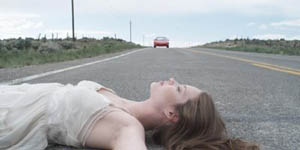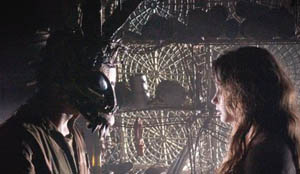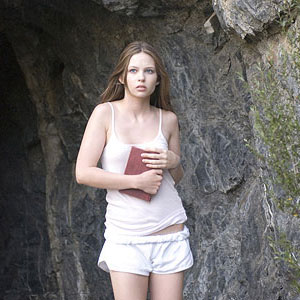|
Writer-director Richard Kelly wants the world to be perfectly clear on the fact that he had nothing whatsoever to do with this sequel to his cult hit Donnie Darko. Since he's apparently perfectly okay with allowing people to know that he did write and direct both Southland Tales and The Box, this should send a shudder of dread up the spines of any thinking about giving this film a whack. 
I'd heard the cries of disgust and recrimination from the scores of Darko acolytes regarding this film, but those sorts of people, the "true believers," if you will, are exactly the sorts of people I automatically distrust. Nowhere are you less likely to get an objective opinion than from a zealot. After all, there's something to be said for the fact that the Donnie Darko Director's Cut was largely disparaged by fans yet more highly-rated by actual film critics; people seem more interested in their own memories and nostalgia than in the art of film craft. So I approached this film waving a flag of truce, willing to give it the opportunity to prove the masses wrong. The film, unfortunately, copped a snob attitude and declined to embrace me in kind, preferring instead to remain cold, distant, and nonsensical. Well, kiss my ass, movie. I tried to be fair about things. Seven years after the original film, Donnie's kid sister Samantha (Daveigh Chase, the sole returning cast member) has run away from home with her friend Corey and is trekking across middle America, lost in the doldrums of generic teen angst which will continue interminably. As it opens, this doesn't feel too bad, however; there was obviously a great deal-too much, ultimately-of effort made to replicate the dreamlike atmosphere of the original film. Sam and Corey are heading across expansive, green-and-blue landscapes tripping on Ecstasy when a blown water pump sidelines them in some podunk town in the midst of nowhere. While spending the night in a local motel, Sam seems to sleepwalk into the night, where she meets a man sitting atop a nearby windmill. Telling him that the world will shortly end, she saves his life when he follows her off of the windmill just before it is obliterated by a meteorite. Right around here, just ten-odd minutes in, I began to get a bad feeling, and nothing that came afterwards did anything to dispel that. 
The man saved by Samantha is known locally as "Iraq Jack," although "that's not his real name," a local deputy helpfully explains. He's suspected, unofficially at least, in the recent disappearances of several local children. He runs around acting freaked out and diving through dumpsters as all war veterans apparently do, judging by the movies they appear in. Other locals include hunky dude Randy, whose younger brother has disappeared, nerdy kid Jeremy, who is fascinated by both the metorite and Sam, a preacher who hands out a book called "Jesusonomy" to suspected sinners, and one of his faithful, who bemoans the coming of "the anus sex" and whose purpose in even showing up on set is oblique given that she never appears to do anything of remotest import. Most of these characters have only the barest hint of personalities, and the leads don't fare much better. The entire film moves at the speed of a turtle with a freight train parked on its back. I was nearly shocked when I thought I had nearly reached the end, only to find the film was barely more than halfway over. Let's just get right down to it: clearly, the filmmakers here were coming from the school of thought which decrees that a sequel should be "same story, only worse." Lifting the entire plot set-up wasn't enough. Darko fans could max out their digits trying to count the plot elements or just plain shot compositions shamelessly pillaged from the first film. Taking on the role-from time to time, anyway- of Frank the rabbit from the original, Sam, speaking in the spooky Frank voice, instructs Iraq Jack to commit acts of destruction, such as burning down a local church. The pastor, after first asserting that the fire couldn't have been a "normal" fire in one of many unexplained alleged plot concepts, is later found to be something of a lecher despite his respected place in the community. There's the fact that the end of the world (which will later become "universe," for some reason) is going to coincide with a holiday. There's the theater scene, and the marquee scene, and the costumed kid on the trampoline, and the tracking shot through a crowd that shifts from slow to fast motion. There is a difference, dear friends, between "maintaining a consistent tone" and "having no ideas of your own." Additionally, attempts to legitimately tie the film into the original range from tenuous to flat-out contradictory. The end of Donnie Darko altered the timeline of events seen throughout most of the film, yet it's these supposedly erased elements that keep popping up-why the hell does Sam have a copy of the Philosophy of Time Travel book? Why does Iraq Jack make a Frank mask? While the character of Frank may not have made total sense in the original film, at least it oddly felt like he did. He had a role. Here, it's just meaninglessly reused trappings. 
Possibly the worst thing here-though there's so many, it's hard to be sure-is the dearth of intertesting or well-developed characters. For all of its flaws of coherency, Donnie Darko had good dialogue, explored its characters' motives, and centered on passionate discussion of personal issues. It may not have been terribly deep, centering as it did on teenage fears, but it felt honest and as though it was a film about ideas. S. Darko is even less coherent and has virtually no ideas or good characters. Corey is a slut who likes to party and gets pointlessly bitchy at Sam solely so she can later feel guilty about what happens next. Jeremy evolves from Captain Nerdburger to Dreamy McBoyband for no apparent reason before going plumb nutso, possibly from a mysterious rash. Randy has, as near as I can tell, no personality to speak of. We could accept Donnie Darko's vagaries in plot due to its success in other areas. Here, there's nothing to pull the blinders down. We're never sure just what's going to happen to the world that's so bad; hell, we're never even conclusively told who's kidnapping the local kids. There's also something to do with a feather. And no, I actually can't explain it any more clearly or fully than that. I suspect that the scriptwriter couldn't, either. I will admit that the film is photographed beautifully, and that Daveigh Chase makes beautiful photographic subject matter. Indeed, if all you're looking for is two hours of Daveigh drifting about in skimpy bedclothes and little airy dresses, then please dive right in. Please be aware that about twenty minutes of that two hours is also devoted to the largest collection of time-lapse cloud shots ever gathered in one place. Between those, losers on Quaaluudes wander hither and yon blabbering nonsense, and the film tries to create audience involvement by repeatedly killing and then ressurrecting characters, sometimes more than once. It's up to you, I suppose, to decide if you think it's worth it. The girl has to have made better films. She could've made only one other, and it would almost certainly still be true. -review by Matt Murray
|
|
||||||||